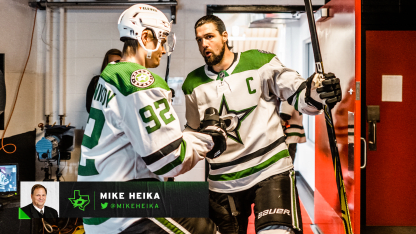In fact, Benn said the fact that Glendening, who suffered a lower-body injury on the hit, was able to come out and sit on the bench in the third period was both inspiring and calming. The veteran forward didn't play but gave encouragement to his teammates as they were protecting a one-goal lead.
"You come off after a shift and make eye contact with him and he's encouraging us to keep going and be better," Benn said. "I'm glad he came back out."
Glendening is a game-time decision for Game 7, Bowness said, but whoever plays will be engaged. In the 2020 playoffs, Joel Kiviranta was called upon because of an injury to Andrew Cogliano and ended up tallying a hat trick, including the game-winning goal in overtime. It's now one of the great stories in franchise history.
"That's what's special about Game 7's," Benn said. "The most unlikely of heroes can rise to the occasion."
Of course, that's more about finding a way to harness your anger and emotions, but it's also about using your energy and digging deep. The Stars needed that desperation in Game 6 to finally flip the script in terms of puck possession and shots on goal and ended up having their best game of the series. Dallas had a 40-38 advantage in shots on goal and outhit the Flames 38-23. That's a pretty neat trick, as teams that win the hit battle so lopsidedly typically don't have the puck that much.
But again, it's about balance. Use the anger, let it simplify your game, and then find a calm place where it all comes together.
"I wouldn't say anger," Bowness said. "It's controlled emotion. You have to play hard, but it has to be under control."
The Stars found that balance in Game 6. Now they have to use it again.
"Of course, it helps," Kiviranta said when asked about the role of anger. "It keeps you in the game when there's a little anger. Calgary got a little angry too because they wanted to move on [in Game 6], but we said `Not today.'"



















